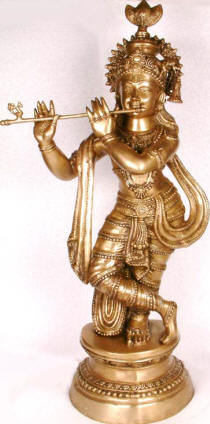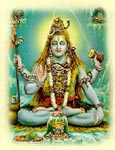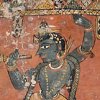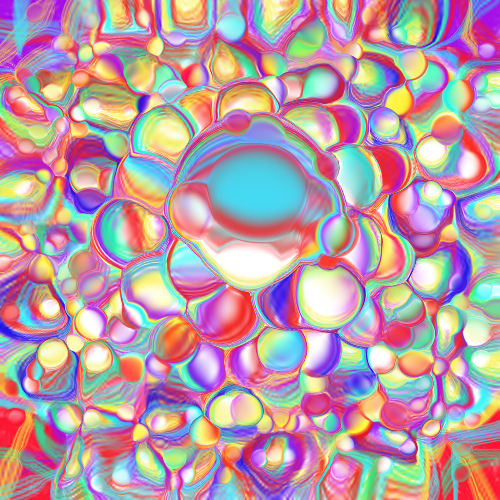In the Mahabharata “Who is Krishna?” - Part Two
 From
the Vision of the Cosmic Form, we understand that Krishna has superhuman
powers, but these powers are used in definite ways for specific occasions. As
God Realized in man, Krishna does not rob the protagonists in the great epic of
their autonomy. The Creator granted us the freedom of choice. We may choose to
identify with and become the God within us, or we may go on and on throughout
the manvantaras in attachment to the temporal illusory hologram, chasing one
phantasmal desire after another.
From
the Vision of the Cosmic Form, we understand that Krishna has superhuman
powers, but these powers are used in definite ways for specific occasions. As
God Realized in man, Krishna does not rob the protagonists in the great epic of
their autonomy. The Creator granted us the freedom of choice. We may choose to
identify with and become the God within us, or we may go on and on throughout
the manvantaras in attachment to the temporal illusory hologram, chasing one
phantasmal desire after another.
This universe may be described as a temporal illusory hologram generated by the creative Power of Maya and the three gunas, but to the five senses the illusion is real enough. We did not come here to simply say - This world is an illusion, a sort of ‘transcendental joke’ (Krishna Chaitanya/KK Nair), and then leave. That would be absurd. We came here to engage in this world, and as long as we are in bodies, we cannot escape the complex quandaries of evil. We have to ‘struggle to realize the good, and evil is what we struggle against.’ (ibid.)
A Cleansing War
Vishnu is the metaphysical principle of all that is good. He is the deity that protects, sustains and supports this universe. Krishna is said to be an incarnation, an avatar of Vishnu/Vasudeva, or perhaps we might see this in terms of Krishna being an incarnation of Vishnu’s metaphysical principles. The purpose of this incarnation is to rid the world of those warriors, the Kshatriya who have forgotten their Dharma, and who have become greedy and cruel. Krishna has come for a war that will cleanse the earth at the end of the Dvapara Yuga.
On many occasions in the Mahabharata it appears that Krishna is encouraging the great war. The Bhagavad Gita itself may be perceived as Krishna’s full endorsement of the slaughter. The Gita’s perspective is that of the Divine, the Creator, the Supreme Self/Paramatman - and not that of man with his confusion, guilt, and fears of death. However along with his intent towards war, Krishna also makes every effort to stop the ensuing holocaust. He serves as an ambassador and diplomat to convince the hardened Duryodhana, who has wrongfully usurped the kingdom, to relinquish even the smallest village back to the Pandavas, Yudhishthira, Arjuna, and the rest.
By both divine providence & exertion on the part of man ...
In this regard, Krishna says that ‘human affairs are accomplished both by divine providence and by exertion on the part of man’ (M.N.Dutt; Udyoga Parva, Ch.79.5). Krishna tries to stop the war by doing ‘that which is capable of being done by human beings.’ The idea that man can be the instrument of the Divine Will is in every religion, and I have always particularly liked the Sufi statement, ‘Praise Allah and tie up your camel!’
Krishna has no delusions about the enemies of Yudhishthira and Arjuna. He does not expect the one hundred sons of Dhritarashtra, headed by the obstinate Duryodhana, to concede anything. Krishna forewarns Arjuna that ‘whatever is capable of being done by me ... shall be done ... but do not expect peace with the enemy’ (ibid.Ch.79.18). Krishna says that these sons have become wicked, their ‘self-respect is gone and [their] hearts have been perverted by avarice’ and they are ‘acting unfairly towards their own chief friends’ (ibid.Ch.95.10). This war is between the members of one family.
Earlier in the Mahabharata, Duryodhana is said to be the incarnation of a demon. When Duryodhana refuses to give up any share of the kingdom, Krishna gives him an ominous forewarning, ‘To get the sleep [death] of a hero is your desire and it will be fulfilled. There will be a great massacre’ (Udyoga Parva, Ch.128.2).
Krishna in a less than conciliatory mood, then calls Duryodhana a fool who has done many wicked deeds and behaved like a dishonorable man. Duryodhana’s mother, Gandhari, also tries to intercede and reason with her son ‘who is afflicted with a passion for kingdom’ (ibid.Ch.129.10). As Krishna has said in the Bhagavad Gita, it is anger (krodhas) and greed that delude men and make them blind (BhG.XVI.4). Duryodhana treats his mother’s words with ‘contempt’ and then crosses the line of all sanity and threatens to capture and imprison Krishna, who has come there solely to negotiate a treaty of peace.
The Vision of the Universal Form
Learning of the evil plot, Krishna confronts Duryodhana, calling him - ‘you of very little intellect’ (Udyoga Parva, Ch.131), and laughs aloud in the Assembly Hall. This laughter turns Krishna’s body into lightning. From his lightning-like body, the gods as rays of fire issue - Brahma on his brow and Rudra (Shiva) on his breast. All the gods and various beings of the universe, those who support the worlds, are seated on Krishna’s arms. Fire springs from his mouth and from the pores of his skin radiate ‘something like the rays of the sun.’
The Vision of Krishna’s Universal Form is so blindingly dazzling that only those with great intelligence and devotion, only those with purity of heart can keep their eyes open. The rest shut their eyes, their hearts filled with fear. ‘Seeing that great wonderful appearance of Madhava (Krishna) in the Assembly Hall, celestial drums were sounded and there was a downpour of flowers’ (ibid.Ch.131.16). The Veils between the Invisible Realms and our earthly world are not yet completely drawn as the ending of the Dvapara Yuga approaches.
The Blind King ‘Sees’
The old blind King Dhritarashtra, father of Duryodhana, prays to Krishna that he may be allowed to behold the Vision and Krishna kindly grants his request made in forthright humility. The Vision is so wondrous that ‘the whole earth moved together and the waters of the sea were agitated’ (Udyoga Parva, Ch.131.22).
Krishna then leaves that assembly of kings, who mesmerized by the event, all follow him ‘like fire accompanied by smoke.’ Krishna gets into his white chariot, ornamented with gold and white tiger skins, to return to Yudhishthira with the bad news.
‘This world will truly come to an end...’
‘This world will truly come to an end ...’ are Krishna’s words after failing to negotiate peace (Udyoga Parva, Ch.143.46). He tells Yudhishthira that the sons of Dhritarashtra are ‘the cause of a universal massacre’ (ibid.Ch.150.20).
The question emerges --- does Krishna come to earth to destroy the world? He says of himself in the Gita (BhG.XI.32), ‘I am Time grown old to destroy the world.’ But who is being destroyed? The Creator is All and dwells within everyone - thus it is the veiled appearances of the One that are being born and dying. The comings and goings of man are impermanent (BhG.II.16). There was never a time when we did not all exist as the One, and there never will be a time when we shall cease to exist (BhG.II.12).
न
त्वेवाहं
जातु
नासं
न
त्वं
नेमे
जनाधिपाः
.
न
चैव
न
भविष्यामः
सर्वे
वयमतः
परम्
.. २-
१२..
natv evāhaṃ jātu nāsaṃ na
tvaṃ neme janādhipāḥ
na caiva na bhaviṣyāmaḥ sarve vayam ataḥ param 2.12
The Supreme Being is the All
Consider the idea that at the end of a Yuga the autonomy of mankind has destroyed the innate balance of the Dharma in that cycle of Time. Therefore to sustain the world, the creator incarnates in worthy vehicles to not only correct the imbalances, but to bring to a close one cycle of Time so that another may begin.
To wipe the canvas clean and begin anew, the old genetic lineages of that Yuga must be made extinct - for the forms of one Yuga are not even recognizable by the forms of another. This is confirmed by the monkey hero Hanuman in the Mahabharata (M.N.Dutt; Vana Parva, Ch.149.6). In the war of the worlds, the battle at Kurukshetra, it is not only the 100 sons of Dhritarashtra that are slaughtered - later the sons of the five Pandus, Yudhishthira, Arjuna, etc., are murdered in their sleep. And even Krishna’s kinsmen, because they are cursed by Dhritarashtra’s wife, Gandhari, eventually all go mad and kill each other in his kingdom of Dvaraka.
Shiva & the Massacre at Night - Sauptika Parva
 This
murder of the sons of the five Pandu and the massacre of the remaining Pandava
armies allows us to once again examine the question of who is Krishna and what
are the limits of his power. The Massacre takes place after the great battle at
Kurukshetra is over and the exhausted victorious troops are finally sleeping.
But the son of Drona, Ashvatthaman, is hell bent on revenge.
This
murder of the sons of the five Pandu and the massacre of the remaining Pandava
armies allows us to once again examine the question of who is Krishna and what
are the limits of his power. The Massacre takes place after the great battle at
Kurukshetra is over and the exhausted victorious troops are finally sleeping.
But the son of Drona, Ashvatthaman, is hell bent on revenge.
The god Shiva is the metaphysical principle of Destruction. What has been created by Brahma and sustained by Vishnu, will inevitably be destroyed by Shiva. What remains in the fields after the harvest must be removed, so that the seeds of new forms can be planted. This is the cyclical nature of Time. Shiva is the greatest ascetic, he lives in the icy peaks of the Himalayas wearing a garland of skulls and snakes. He is often accompanied by a host of demons and ghostlike entities who drink blood and the elixir Soma. These are the phantoms that hover over battlefields fields and scenes of mass horror.
The son of the great sage Drona, Ashvatthaman, seeks Shiva’s help to avenge the death of his father and the others killed by Yudhishthira and Arjuna’s armies. Building a ceremonial sacrificial fire, the young warrior offers his soul to the deity Shiva and climbs into that fire to be consumed as a sacrificial offering. Shiva is pleased by the act and tells Ashvatthaman that he had, up until that moment, been the protector of the Pandavas.
This protection was the result of Krishna’s worshipping Shiva ‘with truth, purity, sincerity, resignation, ascetic practices, vows, forgiveness, devotion, patience, thought and word.’ Shiva then reveals that the Pandavas and their allies ‘have however been assailed by Time. The lease of their lives is over’(M.N.Dutt; Sauptika Parva, Ch.7.60-68).
Cooked by Time
This universe is cyclical. We are all of us located in various stages, moments of time, points on an eternal curve that takes us onward to success and failure, pleasure and pain (sukha-duhkha), birth and death. We are all in the endless process of being ‘cooked’ by Time.
The success of the Pandu brothers, Yudhishthira and Arjuna, was the result of Krishna’s worship of the god Shiva. Krishna’s asceticism and devotion kept the Destroyer at bay, but only for a time. That time has now passed and thus in response to the fiery sacrificial offering, Shiva enters into Ashvatthaman’s body as the primordial power of destruction.
The ‘Possession’ of Ashvatthaman
‘Possessed by that divine being, Drona’s son was worked up with energy derived from godhead, he [Ashvatthaman] became all powerful in battle.’ Ashvatthaman is surrounded by ‘invisible beings’ and Rakshasa demons as he enters the enemy camp to massacre everyone.
‘Thousands of men who were writhing in agony, stricken by anxiety and filled with despair were killed by Ashvatthaman. Burnt by fire ... the men, beside themselves, killed one another’ (Sauptika Parva, Ch. 8.129-131). Shiva must have instilled a kind of madness and confusion in the minds of the sleeping warriors. ‘Many Rakshasas and Pishachas (demons) were seen there, eating human flesh and drinking blood’ (ibid.Ch.8.134).
 Krishna
is away that night and his convenient absence can be read as one more sign of
the cosmic process. The god-that-protects must stand aside when it is necessary
for the god-that-destroys to act. Ashvatthaman could not have succeeded unless
he was possessed by Shiva.
Krishna
is away that night and his convenient absence can be read as one more sign of
the cosmic process. The god-that-protects must stand aside when it is necessary
for the god-that-destroys to act. Ashvatthaman could not have succeeded unless
he was possessed by Shiva.
All of Draupadi’s sons by her five husbands, the Pandu brothers, are slaughtered. The Dvapara Yuga is coming to a close. The Time of the Noble Warriors, the Kshatriyas, is ending and the lineages on both sides of this catastrophic war must be purged. There will be no noble and righteous wars in the Kali Yuga - only wars of greed and self-aggrandizement. Time stops for no man.
The Autonomy of Man within the Fabric of the Matrix
Examining Krishna’s divine attributes and human efforts may lead us to ask how much Free Will do any of us have? Where does the autonomy of man leave off and the Will of the Divine Being begin? Are all our efforts useless against the ineluctable forces of the Cycles of Time. Why should we try to work for the well being of the world, the lokasamgraha, if Time will move inexorably and simply whisk away all that we do.
Krishna’s example should serve us well, for it often seems as the Mahabharata unfolds that Krishna is prescient and already knows the outcome of the story. He knows that Arjuna and his brothers, the Pandus, will win the war; he knows that it was Shiva who allowed Ashvatthaman to kill the sons of Draupadi and the Pandus; and he knows that his kinsmen in Dvaraka will soon kill each other. And yet, Krishna kept working to stop the war. He truly endeavored to encourage both sides of the family to reach a peaceful solution. He warned them of the dire consequences of their actions. He himself went as an ambassador to the wicked Duryodhana to negotiate a settlement.
We might conclude that our Free Will is somewhat like that of an actor in a play. The play has already been written, the characters and their lines are already there, waiting for us to enter into our parts - the machinations of guna-maya. The freedom lies in how well we are able to execute our part, will be be good actors or poor ones. Will we inspire the rest of the company, and based on our acclaim as great performers, go on to other roles in other universes? This business of Free Will is a mystery, is it not.
 Perhaps
Shakespeare had something in common with the poet-author of the Mahabharata, Vyasa, when he said:
Perhaps
Shakespeare had something in common with the poet-author of the Mahabharata, Vyasa, when he said:
All the world's a stage,
And all the men and women merely players.
They have their exits and their entrances ...
- As You Like It (II, vii, 139-143)
Krishna is your own deepest Self!
I don’t pretend to have answered the question - Who is Krishna? I can only hope that I have at least offered you some clues that I have discovered over time for myself, and that these bits have encouraged you to search for your own answers to the wondrous enigma known as Krishna.
Let me return to my hero the Indian scholar Krishna Chaitanya/KK Nair, as it was he who inspired me to ask the question. In the final paragraph of his chapter in The Mahabharata, A Literary Study, entitled ‘Who is Krishna?’ are the following observations.
Krishna is a being who can grow to touch the sky, as the Vision of the Cosmic Form, and he is also ‘intimately small enough to dwell in the hearts of men.’ Krishna is a man who can befriend Arjuna, and yet he is also one who identifies himself with the deities Vishnu and Shiva, and even the poet-author Vyasa.
‘History can be redeemed only by the partnership of deity and man, but deity is the indweller. The counsel that Arjuna gets from Krishna is the counsel of his own, man’s own, deepest Self.’
